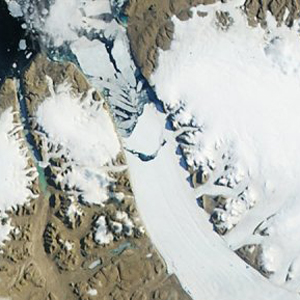Please note: Osher Rainforest will be closed for maintenance Jan. 14–16.
Science News
Record-Breaking Climate
August 29, 2012

With this week’s news of the record low for Arctic sea ice and headlines of one of the hottest summers on record, we thought we’d take a moment to look at some global warming headlines from the past month or so. Especially since climate change discussions remain dismayingly absent from the current presidential campaign.
The Arctic sea ice is the second record-breaking melt of the summer. The first: Greenland. From Science News:
…more of Greenland’s ice melted in June and July than in any previous year during the satellite era…
The summer’s heat wave and darkening ice cap contributed to the melt and researchers predict that melting will continue on the frozen island in accelerated fits and starts.
Is climate change responsible for extreme weather like this year’s heat wave and drought? NASA climatologist James Hansen, who has been warning about climate change since the 1980s, had a controversial publication in the Proceedings of the National Academy of Sciences earlier this month linking climate and extreme weather.
Just a week prior to Hansen’s publication, UC Berkeley’s Richard Muller wrote an Op-Ed piece for the New York Times declaring himself a converted skeptic on climate change. You’ll recall a piece we wrote on his research confirming global warming last fall, but in the Times article he states explicitly:
I’m now going a step further: Humans are almost entirely the cause.
In Rolling Stone, Bill McKibben boils things down to three numbers: the internationally agreed-upon cap in temperature rise (2°C), the amount of carbon dioxide the atmosphere can absorb before we hit that cap (565 gigatons), and the amount of carbon dioxide produced by burning our remaining fossil-fuel reserves (2,795 gigatons). He sums things up quite plainly:
We have five times as much oil and coal and gas on the books as climate scientists think is safe to burn. We’d have to keep 80 percent of those reserves locked away underground to avoid that fate. […] Yes, this coal and gas and oil is still technically in the soil. But it’s already economically aboveground…
Several articles in the past month have demonstrated how climate change is contributing to changing ecosystems—from oysters to shifting ranges for species like birds to increasing disease in frogs to dying Arctic coastlines. Even high school football isn’t safe from global warming. (Gasp!)
Will an all-American activity like football wake folks up to the fact that human-caused climate change is real? What will it take? A new special issue of Scientific American confronts the question, “How Far Can Climate Change Go?”
What do you think? I saw the Lorax movie over the weekend. Kinda cheesy and I wouldn’t recommend it. But it’s closing line rings true (from the book by Dr. Seuss, originally):
Unless someone like you cares a whole awful lot, nothing is going to get better. It’s not.
Image: NASA